The End of Time
- 格式:pdf
- 大小:422.74 KB
- 文档页数:48
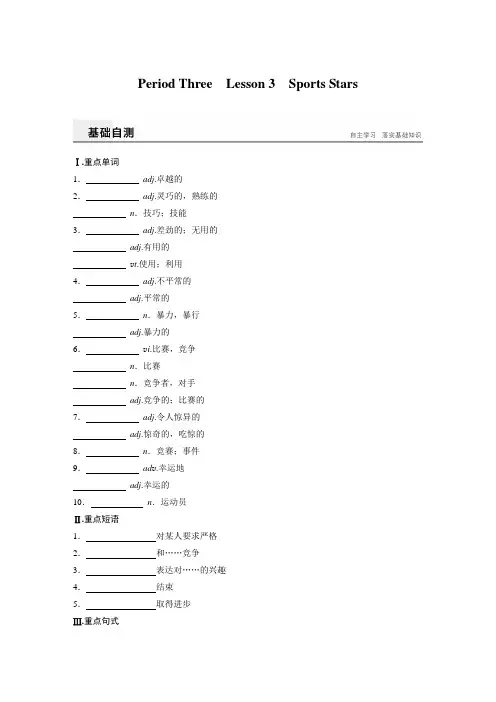
Period Three Lesson 3Sports StarsⅠ.重点单词1.adj.卓越的2.adj.灵巧的,熟练的n.技巧;技能3.adj.差劲的;无用的adj.有用的v t.使用;利用4.adj.不平常的adj.平常的5.n.暴力,暴行adj.暴力的6.v i.比赛,竞争n.比赛n.竞争者,对手adj.竞争的;比赛的7.adj.令人惊异的adj.惊奇的,吃惊的8.n.竞赛;事件9.ad v.幸运地adj.幸运的10.n.运动员Ⅱ.重点短语1.对某人要求严格2.和……竞争3.表达对……的兴趣4.结束5.取得进步Ⅲ.重点句式1.when引导的定语从句In a recent interview,Venus spoke about the time she and Serena were practising tennis and they had to run and hide as bullets started flying through the air.在最近一次采访中,维纳斯说,那个时候她和莎莲娜练网球时,一路得跑着躲闪空中穿梭的子弹。
2.since then与现在完成时连用Finally,in 1991,the sisters and their family moved to a safer area and since then they .最终在1991年,她们举家搬到一个较安全的地区,从此再也没有到故地造访过。
3.“while+分词”的省略结构Brandi,the sisters’ mother,taught her daughters at home so that they completed their high school while (develop) their tennis careers.妈妈布兰蒂则在家中教两姐妹文化知识。
这样,才使她们既没有间断网球生涯,又能顺利地完成高中学业。
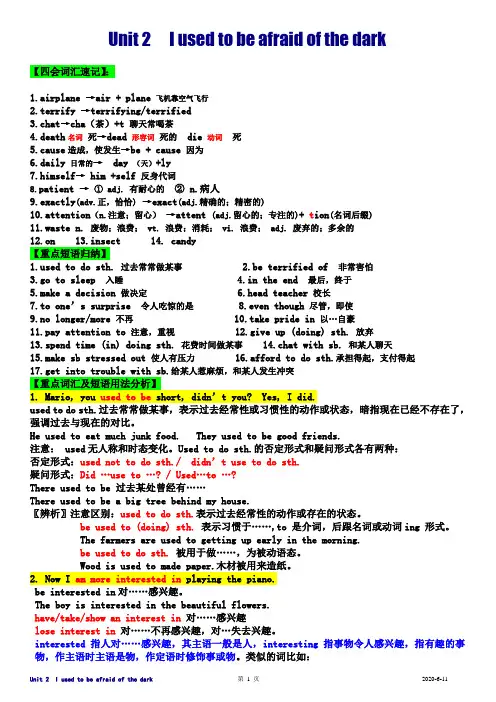
Unit 2 I used to be afraid of the dark【四会词汇速记】:1.airplane →air + plane 飞机靠空气飞行2.terrify →terrifying/terrified3.chat→cha(茶)+t 聊天常喝茶4.death名词死→dead 形容词死的 die 动词死5.cause造成,使发生→be + cause 因为6.daily 日常的→ day (天)+ly7.himself→ him +self 反身代词8.patient →① adj. 有耐心的② n.病人9.exactly(adv.正,恰恰)→exact(adj.精确的;精密的)10.attention(n.注意;留心)→attent (adj.留心的;专注的)+ t ion(名词后缀)11.waste n. 废物;浪费; vt. 浪费;消耗; vi. 浪费; adj. 废弃的;多余的12.on 13.insect 14. candy【重点短语归纳】ed to do sth. 过去常常做某事2.be terrified of 非常害怕3.go to sleep 入睡4.in the end 最后,终于5.make a decision 做决定6.head teacher 校长7.to one’s surprise 令人吃惊的是 8.even though 尽管,即使9.no longer/more 不再10.take pride in 以…自豪11.pay attention to 注意,重视 12.give up (doing) sth. 放弃13.spend time (in) doing sth. 花费时间做某事 14.chat with sb. 和某人聊天15.make sb stressed out 使人有压力 16.afford to do sth.承担得起,支付得起17.get into trouble with sb.给某人惹麻烦,和某人发生冲突【重点词汇及短语用法分析】1. Mario, you used to be short, d idn’t you? Yes, I did.used to do sth.过去常常做某事,表示过去经常性或习惯性的动作或状态,暗指现在已经不存在了,强调过去与现在的对比。
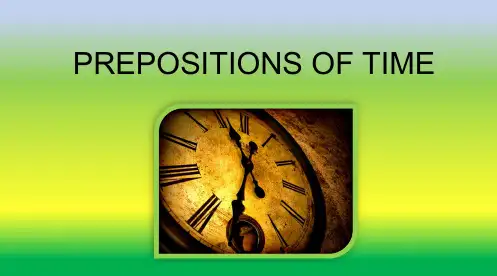
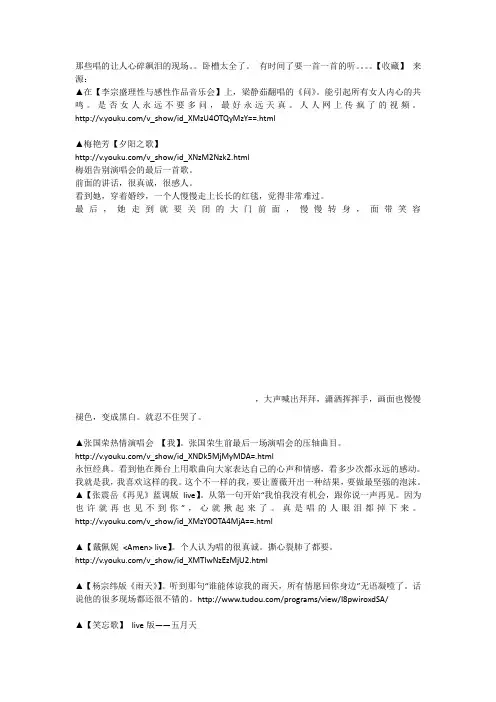
那些唱的让人心碎飙泪的现场。
卧槽太全了。
有时间了要一首一首的听。
【收藏】来源:▲在【李宗盛理性与感性作品音乐会】上,梁静茹翻唱的《问》。
能引起所有女人内心的共鸣。
是否女人永远不要多问,最好永远天真。
人人网上传疯了的视频。
/v_show/id_XMzU4OTQyMzY==.html▲梅艳芳【夕阳之歌】/v_show/id_XNzM2Nzk2.html梅姐告别演唱会的最后一首歌。
前面的讲话,很真诚,很感人。
看到她,穿着婚纱,一个人慢慢走上长长的红毯,觉得非常难过。
最后,她走到就要关闭的大门前面,慢慢转身,面带笑容,大声喊出拜拜,潇洒挥挥手,画面也慢慢褪色,变成黑白。
就忍不住哭了。
▲张国荣热情演唱会【我】。
张国荣生前最后一场演唱会的压轴曲目。
/v_show/id_XNDk5MjMyMDA=.html永恒经典。
看到他在舞台上用歌曲向大家表达自己的心声和情感,看多少次都永远的感动。
我就是我,我喜欢这样的我。
这个不一样的我,要让蔷薇开出一种结果,要做最坚强的泡沫。
▲【张震岳《再见》蓝调版live】。
从第一句开始“我怕我没有机会,跟你说一声再见。
因为也许就再也见不到你”,心就揪起来了。
真是唱的人眼泪都掉下来。
/v_show/id_XMzY0OTA4MjA==.html▲【戴佩妮<Amen> live】。
个人认为唱的很真诚。
撕心裂肺了都要。
/v_show/id_XMTIwNzEzMjU2.html▲【杨宗纬版《雨天》】。
听到那句“谁能体谅我的雨天,所有情愿回你身边”无语凝噎了。
话说他的很多现场都还很不错的。
/programs/view/I8pwiroxdSA/▲【笑忘歌】live版——五月天每次看这段视频都满感动。
阿信太会煽情了吧= =#/v_show/id_XMTM4MTM4MDM2.html▲陈奕迅《人来人往》live版。
至今的最爱。
歌词多痛啊。
“最美丽长发未留在我手,我也开心饮过酒”。
其实是最后听到陈奕迅真诚的说“谢谢你林夕谢谢你写了这么好的词给我”瞬间崩溃掉。
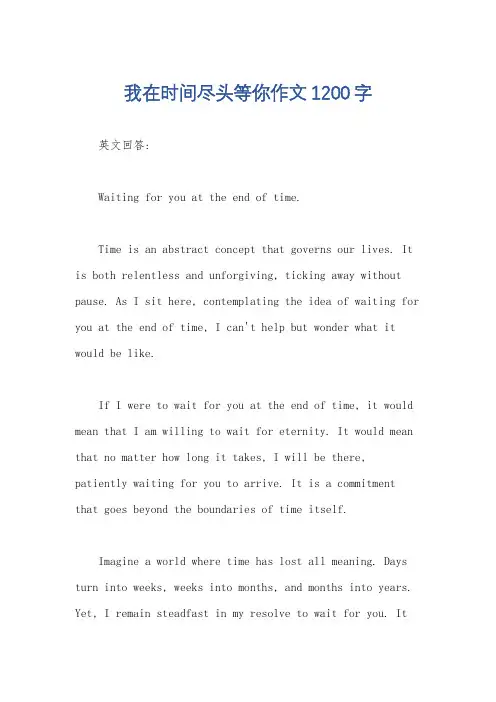
我在时间尽头等你作文1200字英文回答:Waiting for you at the end of time.Time is an abstract concept that governs our lives. It is both relentless and unforgiving, ticking away without pause. As I sit here, contemplating the idea of waiting for you at the end of time, I can't help but wonder what it would be like.If I were to wait for you at the end of time, it would mean that I am willing to wait for eternity. It would mean that no matter how long it takes, I will be there,patiently waiting for you to arrive. It is a commitmentthat goes beyond the boundaries of time itself.Imagine a world where time has lost all meaning. Days turn into weeks, weeks into months, and months into years. Yet, I remain steadfast in my resolve to wait for you. Itis a testament to the depth of my love for you, a love that transcends time and space.In this timeless realm, I would find solace in the memories we have created together. Our laughter, our tears, our shared experiences would be my constant companions. They would remind me of the bond we share, and give me the strength to carry on.But waiting for you at the end of time is not without its challenges. It requires a tremendous amount of patience and perseverance. There will be moments of doubt and uncertainty, when the weight of time bears down on me. Yet, I will remain steadfast, for I know that you are worth the wait.中文回答:在时间尽头等你。
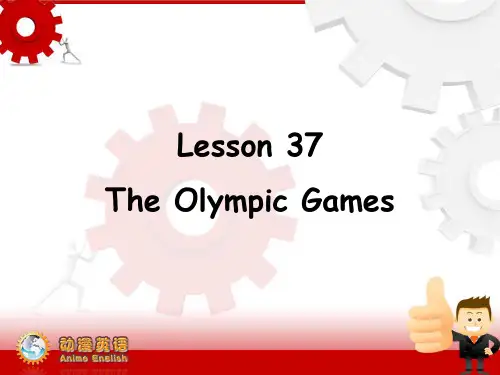
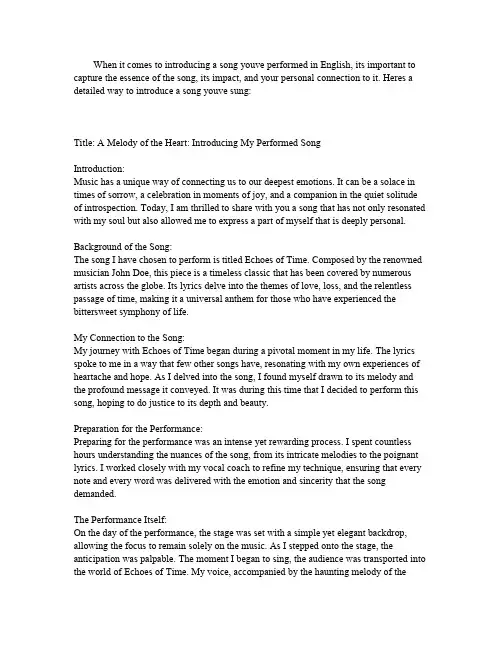
When it comes to introducing a song youve performed in English,its important to capture the essence of the song,its impact,and your personal connection to it.Heres a detailed way to introduce a song youve sung:Title:A Melody of the Heart:Introducing My Performed SongIntroduction:Music has a unique way of connecting us to our deepest emotions.It can be a solace in times of sorrow,a celebration in moments of joy,and a companion in the quiet solitude of introspection.Today,I am thrilled to share with you a song that has not only resonated with my soul but also allowed me to express a part of myself that is deeply personal. Background of the Song:The song I have chosen to perform is titled Echoes of posed by the renowned musician John Doe,this piece is a timeless classic that has been covered by numerous artists across the globe.Its lyrics delve into the themes of love,loss,and the relentless passage of time,making it a universal anthem for those who have experienced the bittersweet symphony of life.My Connection to the Song:My journey with Echoes of Time began during a pivotal moment in my life.The lyrics spoke to me in a way that few other songs have,resonating with my own experiences of heartache and hope.As I delved into the song,I found myself drawn to its melody and the profound message it conveyed.It was during this time that I decided to perform this song,hoping to do justice to its depth and beauty.Preparation for the Performance:Preparing for the performance was an intense yet rewarding process.I spent countless hours understanding the nuances of the song,from its intricate melodies to the poignant lyrics.I worked closely with my vocal coach to refine my technique,ensuring that every note and every word was delivered with the emotion and sincerity that the song demanded.The Performance Itself:On the day of the performance,the stage was set with a simple yet elegant backdrop, allowing the focus to remain solely on the music.As I stepped onto the stage,the anticipation was palpable.The moment I began to sing,the audience was transported into the world of Echoes of Time.My voice,accompanied by the haunting melody of thepiano,filled the auditorium,weaving a tapestry of sound that told a story of love and longing.The Impact of the Performance:The response to my performance was overwhelming.The audience was deeply moved, with many expressing their appreciation for the raw emotion and sincerity with which I approached the song.It was a moment of validation,not just for my performance,but also for the power of music to touch hearts and create connections.Conclusion:In conclusion,Echoes of Time is more than just a song I performed it is a testament to the power of music to evoke emotion and tell stories that resonate with us on a profound level.My journey with this song has been one of growth,selfdiscovery,and a deeper appreciation for the art of song.I hope that my rendition of Echoes of Time has touched you as deeply as it has touched me.This introduction provides a comprehensive overview of the song,your connection to it, and the impact of your performance,creating a vivid picture for the reader or listener.。
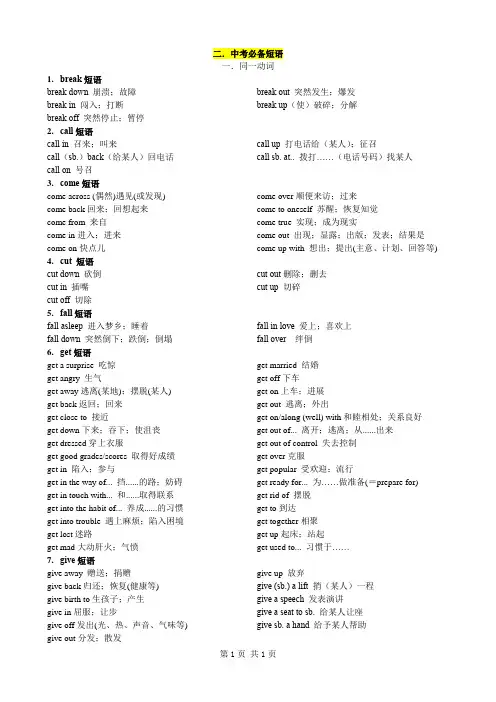
二.中考必备短语一.同一动词1.break短语break down 崩溃;故障break in 闯入;打断break off 突然停止;暂停break out 突然发生;爆发break up(使)破碎;分解2.call短语call in 召来;叫来call(sb.)back(给某人)回电话call on 号召call up 打电话给(某人);征召call sb. at.. 拨打……(电话号码)找某人e短语come across (偶然)遇见(或发现) come back回来;回想起来come from 来自come in进入;进来come on快点儿come over顺便来访;过来come to oneself 苏醒;恢复知觉come true 实现;成为现实come out 出现;显露;出版;发表;结果是come up with 想出;提出(主意、计划、回答等)4.cut 短语cut down 砍倒cut in 插嘴cut off 切除cut out删除;删去cut up 切碎5.fall短语fall asleep 进入梦乡;睡着fall down 突然倒下;跌倒;倒塌fall in love 爱上;喜欢上fall over 绊倒6.get短语get a surprise 吃惊get angry 生气get away逃离(某地);摆脱(某人) get back返回;回来get close to 接近get down下来;吞下;使沮丧get dressed穿上衣服get good grades/scores 取得好成绩get in 陷入;参与get in the way of... 挡......的路;妨碍get in touch with... 和......取得联系get into the habit of... 养成......的习惯get into trouble 遇上麻烦;陷入困境get lost迷路get mad大动肝火;气愤get married 结婚get off下车get on上车;进展get out 逃离;外出get on/along (well) with和睦相处;关系良好get out of... 离开;逃离;从......出来get out of control 失去控制get over克服get popular 受欢迎;流行get ready for... 为……做准备(=prepare for) get rid of 摆脱get to到达get together相聚get up起床;站起get used to... 习惯于……7.give短语give away 赠送;捐赠give back归还;恢复(健康等)give birth to生孩子;产生give in屈服;让步give off发出(光、热、声音、气味等) give out分发;散发give up 放弃give (sb.) a lift 捎(某人)一程give a speech 发表演讲give a seat to sb. 给某人让座give sb. a hand 给予某人帮助go abroad 出国go away走开;离开go along(the street)沿着(这条街)走go back 回去go boating 去划船go by 时间逝去;经过go camping 去野营go fishing 去钓鱼go for a picnic 去野餐go for a walk 去散步go home 回家go off (闹钟)发出响声go on 继续go on a trip 去旅行go on a vacation 去度假go out外出(娱乐)go out of date 过时go out of one’s way 特地;格外努力go over 仔细检查;复习go shopping 去购物go through 浏览;翻阅;通过go to bed 去睡觉go to school 去上学go to sleep 开始睡觉;入睡go to the/a doctor 去看医生go to the movies 去电影院go upstairs/downstairs 上/下楼9.look短语look after 照料;照顾look around向四周看look at看着look down 向下看look back at 回首(往事);回忆;回顾look down upon/on瞧不起;轻视look for 寻找look forward to盼望;期待look into调查look like 看起来像look out留神;当心look out of... 从……朝外看look through快速查看;浏览look over... (仔细)检查;从……上面看look up (在词典、参考书中或通过电脑)查阅;抬头看look up to 钦佩;仰慕(=admire)10.make短语make a call 打电话make a choice 做选择make a difference影响;有作用make a fire 生火make a list 列清单make a living谋生make a mess弄得一团糟(一塌糊涂)make a mistake 犯错make a plan 制定计划make a promise 许诺make a speech 做演讲make a wish许愿make an effort/efforts作出努力make dinner 做晚饭make dishes 做菜make...feel at home 使......感到宾至如归make friends结交朋友make money 挣钱make (a) noise/make noises 制造噪音make one's bed铺床make one's mind某人下定决心make one's own decision 自己做决定make one’s way 前往;费力地前进make progress取得进步make rules 制定规则make sense 讲得通;有道理make soup 做汤make sure 确保;查明make up 编造(故事、谎言等)make use of 使用,利用11.put短语put... away把……收起来put down记下;镇压;放下put off推迟put on增加(体重);发胖put out熄灭;扑灭put sth. to good use 好好利用某物put up搭起;举起set off 动身;出发;使爆炸set out 出发;启程set up 建起;设立13.take短语take a message捎个口信;传话take a photo 照相take a rest 休息一会儿take a shower洗淋浴take a trip去旅行take a vacation/holiday 去度假take a walk散步;走一走take action采取行动take after (外貌或行为)像take an interest in... 对……感兴趣take away拿走take back 退还;收回take breaks(take a break) 休息take care当心;小心take care of照顾;处理take down 拆除;往下拽;记录take in 吸入;吞入(体内)take notes做笔记take off 脱下(衣服);(飞机等)起飞take one's temperature 量体温take one’s time 从容进行;慢慢来take one's order点菜take out取出;拿出take over接收;接管take part in参加take place发生;出现take pride in... 为……感到自豪/骄傲(=be proud of) take risks (take a risk) 冒险take sb’s place代替;替换take...seriously 认真对待......take subway乘地铁take the place of 代替,取代take the subway/bus 乘地铁/公交take turns轮流take up (尤指为消遣)学着做;开始做14.turn短语turn down 拒绝turn...into 变成turn off 关掉turn on 接通(电流、煤气、水等);打开同一介词/副词型1.about短语argue about... 为……而争吵care about 关心;在意complain about 抱怨dream about梦到hear about 听说know about了解;知道learn about 了解;学习talk about谈论;讨论;议论think about思考;思索worry about担心;烦恼2.at短语arrive at 抵达knock at 敲laugh at 嘲笑look at看着point at 指着shout at... 冲......大声叫嚷3.away短语blow away 吹走clear away清除drive away 驱车离开;赶走get away逃离(某地);摆脱(某人) give away 赠送;捐赠go away走开;离开move away 搬走;离开pass away去世put... away把……收起来run away 跑开sweep away 扫去take away拿走throw away扔掉;抛弃walk away 步行离开wash away 冲走;洗掉bring back 恢复;使想起;归还call (sb.) back (给某人)回电话come back回来;回想起来get back返回;回来give back归还;恢复(健康等) look back 回顾,回头看pay back 偿还(借款等)shout back喊回去take back 撤消;拿回talk back 回嘴;顶嘴5.by短语be made by... 由.....制成drop by 顺便访问;随便进入go by (时间)逝去;经过pass/walk by 路过;经过6.down短语break down 发生故障calm down 平静下来;镇定下来close down (永久)关闭,关停cut down 砍倒die down 逐渐变弱;逐渐消失fall down 突然倒下;跌倒;倒塌get down下来;吞下;使沮丧let...down 使......失望lie down 躺下look down 向下看look down upon/on瞧不起;轻视pass down 传下来;遗传pull down 拆下;摧毁put down记下;镇压;放下shoot down 射下shut down 停工,关闭sit down 坐下slow down 减速take down 拆除;往下拽;记录turn down拒绝;调低,调小(音量等) write down 写下;记录下7.for短语ask for 请求;恳求(给予) call for 要求;提倡;需要care for照顾;非常喜欢cheer for... 为......加油die for... 为......而死fight for... 为......而战hope for 盼望;希望(得到)leave for... 动身去;到……地方去look for 寻找,寻求pay for付费;付出代价prepare for... 为……做准备search for 寻找;寻求stand for代表wait for等候;等待8.from短语borrow...from... 从......借......come from/be from 来自die from 死于hear from... 接到(某人的)信、电话等keep away from 避免接近;远离learn... from... 向......学习......prevent sb./sth. from 阻止某人/某物做某事protect... from... 保护......免受......的侵害run away from 逃离;逃避separate from 分离;隔开stay away from 远离;躲避stop... from doing sth. 阻止......做某事9.in短语arrive in 到达believe in 信任;信赖break in 突然闯入;打断call in 召来;叫来come in进入;进来cut in 插嘴;干预fill in 填补;填写get in 陷入;参与give in屈服;让步hand in 上交;提交;呈送join in / take part in 参加take an interest in... 对……感兴趣take in 吸入;吞入(体内)take part in参加take pride in... 为……感到自豪/骄傲(=be proud of)10.into短语divide... into 把......分成fall / drop into 落入;陷入get into 陷入;参与knock into... 与......相撞look into调查rush into 冲入translate......into 把.....翻译成turn into变成walk into 走路时撞上11.of短语be made of... 由......制成/组成come out of... 从......出来die of 死于dream of 梦想;梦见get hold of 抓住get out of... 离开;从......出来hear of 听说look out of... 从……朝外看remind sb. of sth. 使某人想起某事run out of 用尽;耗尽take care of 照顾;处理take the place of 代替,取代think of 认为;想起12.off短语break off 突然停止;中断cut off 切除clean off 把……擦掉cool off 冷静下来;使变凉fall off... 从......掉下来get off下车give off发出(光、热、声音、气味等)go off (闹钟)发出响声keep off 避开;(雨、雪等)没有下;回避某话题kick sb. off 开除某人pay off 还清(欠款等)put off 推迟see...off 为......送行set off 出发show off炫耀;卖弄shut off 关闭;停止运转start off 出发,开始take off 脱下(衣服);(飞机等)起飞turn off 关掉13.on短语agree on... 对......取得一致意见carry on 继续come on快点儿depend on 依靠;依赖fight on 坚持,继续奋斗focus on 致力于;使聚焦于go on 继续hold on 等一等(别挂电话)keep on 坚持knock on 敲land on 着陆;登陆live / feed on... 以......为食look down upon/on瞧不起;轻视pass on 传递put on增加(体重);发胖try on 试穿turn on 接通(电流、煤气、水等);打开work on 从事;忙于14.up短语break up 粉碎;破碎bring up养育;抚养call up 打电话给(某人);征召cheer up (使)变得更高兴;振奋起来clean up打扫(或清除)干净climb up 攀登;升高cut up切碎dress up装扮;乔装打扮drink up 喝光eat up 吃光end up最终成为;最后处于fix up 修理;装饰get up 起床;站起give up 放弃go up 上去grow up长大;成熟;成长hang up挂断(电话)heat up 使变热;加热hurry up 赶快;急忙(做某事) lift up 举起;抬起light up 照亮line up 排列;排队look up (在词典、参考书中或通过电脑)查阅;抬头看make up 编造(故事、谎言等)mix up 混合在一起pick up接电话put up 搭起;举起ring up 打电话set up建起;设立show up赶到;露面speak up 大点儿声说;大胆讲stand up 起立;(论点、论据等)站得住脚的;经久耐用的stay up深夜不睡;熬夜take up (尤指为消遣)学着做;开始做think up 想出turn up 调高(音量);出现use up 用完;耗尽wake...up把……弄醒warm up 热身;做准备活动15.out短语blow out吹灭break out (战争、火灾等)突然发生;爆发bring out 使显现;使表现出call out 呼唤check out察看;观察clean... out清除;把……打扫干净clear out清理;丢掉come out 出来;出版cry out 呐喊;呼喊cut out删除;删去die out 灭绝;消失eat out出去吃饭figure out 计算出;弄明白find out 查明;弄清(情况)get out of 离开;从……出来go out外出(娱乐)hand out分发hang out闲逛;常去某处help out (帮助……)分担工作、解决难题lay out摆开;布置leave out 忽略;不提及;不包括look out 当心;注意;向外看point out指出put out 扑灭;熄灭reach out 伸出run out (of) 用尽;耗尽sell out 卖光send out 发送;派遣set out出发;启程take out取出;拿出try out 参加选拔;试用work out成功地发展;解决16.over短语come over顺便来访;过来fall over 绊倒get over克服go over 仔细检查;复习look over... (仔细)检查;从……上面看take over接收;接管think over 仔细考虑run over to 跑到turn over翻身;翻转17.to短语according to依据;按照add to sth. 增加某物belong to sb. 属于某人compare... to... 把.....比作,把......比喻为...... dance to music 随着音乐起舞express... to... 向......表达......get to到达help oneself to... 请随便吃/喝......hold on to 继续;坚持;保持lead to 导致;通向lend... to... 把......借给......listen to 听live up to 活到look forward to期待;盼望look up to 钦佩;仰慕(=admire)point to 指向(远处)say sorry/goodbye to sb. 向某人道歉/道别shout to... 对......大声喊叫speak to sb. 对某人说话spread... to... 向......传播......stick to坚持;固守talk to sb. 跟某人说used to (do) 过去常常(做)write to sb. 给某人写信18.with短语agree with... 同意;和……意见一致argue with... 和……争吵begin with... 以……开始break up with... 跟……分手;与……断绝关系catch up with赶上;跟上come up with 想出;提出(主意、计划、回答等) communicate with sb. 和某人交流compare...with... 比较...;对比... connect...with... 把……和……连接或联系起来deal with 应对;处理do with 处理(与what连用)end up with... 以......结束fall in love with爱上fight with... 与......打架fill with 装满,充满get on/along (well) with和睦相处;关系良好have to do with... 关于;与……有关系help (sb.)with sth. 在某方面帮助(某人)keep in touch with... 与……保持联系make friends with 与......交朋友part with放弃;交出(尤指不舍得的东西) play with... 玩......;和......玩耍provide...with... 为……提供……share... with... 与......分享......stay with sb. 和某人待在一起talk with sb. 与某人交谈形容词短语1.be+adj.+about短语be careful about…对……小心be crazy about…对……疯狂be excited about… 对......感到兴奋be nervous about… 因......而紧张be pleased about… 因......感到高兴be sad about… 为......而难过be serious about… 对......是认真的be sorry about… 对......感到抱歉be sure about… 确信;对……有把握be worried about…对……感到担心2.be+adj.+at短语be amazed at…对......感到惊讶be angry at…因......而生气be good at… 擅长于……be mad at…对……生气be surprised at…对……感到惊讶3.be+adj.+for短语be bad for…对……有坏处be famous/known for… 因……而著名be good for…对……有好处be late for迟到be necessary for…对......有必要be/get ready for…为……做准备(=prepare for) be responsible for… 对……有责任;负责任be short for… 是……的简称;是……的缩写be sorry for…对……感到抱歉/遗憾be suitable/fit for…适合……be thankful for…因……而感激be thirsty for 渴望;渴求4.be+adj.+from短语be a bsent from…缺席be different from… 与……不同;与……有差异be far from…远离……be separated from…与......分离5.be+adj.+of短语be afraid of…害怕……be ashamed of…对……感到羞愧be careful of… 小心,注意;当心……be fond of…喜欢……be full of… 满是……的;(有)大量的;(有)丰富的be proud of… 为……感到骄傲be short of… 缺少;不到;不够be sure of…对……有把握be tired of…对……感到厌倦6.be+adj.+in短语be born in…出生于be confident in…对......有信心be disappointed in…对......感到失望be interested in…对……感兴趣be rich in…富含......be strict in…对......要求严格be successful in…在......成功be talented in…在......方面有天赋be weak in…在……方面薄弱7.be+adj.+with短语be angry with…生……的气be bored with…对……感到厌烦be born with天生具有be busy with…忙于……be careful with…小心(对待)......be covered with…被......所覆盖be familiar wit h…对……熟悉be filled with充满;装满be friends with sb. 成为某人be patient with…对……有耐心be good with…善于应付……的;对……有办法be pleased with… 对……感到满意be popular with…受……欢迎be satisfied with…对……感到满意be strict with… 对……要求严格介词短语1.as短语as a result 因此;结果as...as... 像......一样......as far as I know 据我所知as for 至于;关于as if 好像as long as 只要;既然as soon as possible 尽快as usual 像往常一样as well 也;还有as you know如你所知2.at短语at a time 每次,一次at birth出生时at first起初;起先at home 在家at last最后;终于at least至少;不少于;起码at most 最多at night 在晚上at once立刻;马上at present目前;现在at school 在上学;在学校at that moment 在那时at that time 那时候at the age of… 在……岁时at the beginning of 在……开始at the bottom of… 在......底部at the end of… 在……末端,到……尽头at the foot of… 在......底部;在......脚下at the moment 此时;现在at the same time 同时at the top of… 在......顶部或顶端at times有时;偶尔at weekends/ the weekend 在周末at work 在工作3.by短语by accident 偶然;意外地(=by chance) by air/ plane 乘飞机by bike 骑自行车by hand 手工by heart 凭记忆;能背诵by mistake 错误地;无意中by oneself 独自地by the end of在(某时间点)以前by the time在以前by the way顺便说(问)一下by train 乘火车by turns 轮流4.for短语for a while 一会儿for example例如(=such as)for sale 待售for sure 无疑;肯定5.from短语across from…在……对面from now on 从今/此以后;今后from then on 从那时起from time to time 时常;有时from... to... 从......到......6.in短语in a hurry 匆忙地in a low voice 低声地in a row 连续几次地in a word 总之in agreement 一致;同意;意见一致in case of 万一in common共同的;共有的in control of 掌管;管理in danger处于危险之中in fact确切地说;事实上;实际上in front of…在......前面(外部)in general 总之,通常;一般而言in good health 健康状况良好in half 分成两半in need 在危难中;在困境中in need of 需要;缺少in one's opinion 依某人看in order整齐;秩序井然in order to目的是;为了in other words 换句话说in pain 痛苦地in peace 和平地in person亲身;亲自in public公开地;在别人(尤指生人)面前in return作为回报in silence沉默;无声in space 在太空中in style流行;时尚地in surprise 惊奇地in that case既然那样;假使那样的话in the distance 在远处in the end最后in the face of面对(问题、困难等)in the front of…在......前面(内部)in the future 在将来in the middle of…在......中间in this way 以这种方式in time及时in total总共;合计in trouble处于困境中(=in need)in turn依次;轮流7.of短语ahead of…在......之前,提前all of a sudden 突然;猛地because of 因为;由于first of all 首先instead of 代替;而不是8.on短语on board在船(火车、飞机)上on business出差on duty值日;值班on fire着火;失火on foot步行on hand 在手边on holiday度假[=on (a)vacation]on one’s own 独自on purpose故意地on sale出售;降价出售on show 展出on the Internet 在网上on the left 在左边on the right 在右边on the one hand... on the other hand... 一方面......另一方面...... on the same day/date 在同一天on the / one’s way to…在某人去......的路上on time准时on weekends/the weekend (在)周末9.to短语according to…根据;按照;据......所说;视......而定close to 接近next to…紧靠......的旁边;贴近;最接近thanks to 多亏;由于to be honest 说实在的to one's surprise 使某人惊讶的是;出乎某人的意料to start with起初;开始时up to 多达。
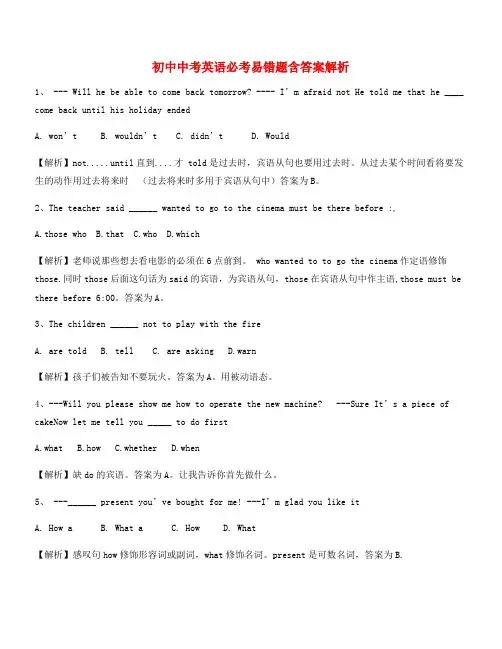
初中中考英语必考易错题含答案解析1、 --- Will he be able to come back tomorrow? ---- I’m afraid not He told me that he ____ come back until his holiday endedA. won’tB. wouldn’tC. didn’tD. Would【解析】not.....until直到....才 told是过去时,宾语从句也要用过去时。
从过去某个时间看将要发生的动作用过去将来时(过去将来时多用于宾语从句中)答案为B。
2、The teacher said ______ wanted to go to the cinema must be there before :,A.those whoB.thatC.whoD.which【解析】老师说那些想去看电影的必须在6点前到。
who wanted to to go the cinema作定语修饰those.同时those后面这句话为said的宾语,为宾语从句,those在宾语从句中作主语,those must be there before 6:00。
答案为A。
3、The children ______ not to play with the fireA. are toldB. tellC. are askingD.warn【解析】孩子们被告知不要玩火。
答案为A。
用被动语态。
4、---Will you please show me how to operate the new machine? ---Sure It’s a piece of cakeNow let me tell you _____ to do firstA.whatB.howC.whetherD.when【解析】缺do的宾语。
答案为A。
让我告诉你首先做什么。
5、 ---______ present you’ve bought for me! ---I’m glad you like itA. How aB. What aC. HowD. What【解析】感叹句how修饰形容词或副词,what修饰名词。
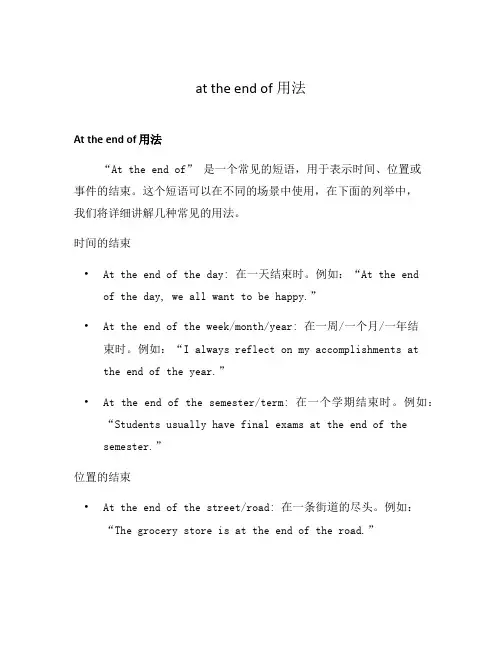
at the end of用法At the end of 用法“At the end of” 是一个常见的短语,用于表示时间、位置或事件的结束。
这个短语可以在不同的场景中使用,在下面的列举中,我们将详细讲解几种常见的用法。
时间的结束•At the end of the day: 在一天结束时。
例如:“At the end of the day, we all want to be happy.”•At the end of the week/month/year: 在一周/一个月/一年结束时。
例如:“I always reflect on my accomplishments atthe end of the year.”•At the end of the semester/term: 在一个学期结束时。
例如:“Students usually have final exams at the end of thesemester.”位置的结束•At the end of the street/road: 在一条街道的尽头。
例如:“The grocery store is at the end of the road.”•At the end of the hallway: 在走廊的尽头。
例如:“The principal’s office is at the end of the hallway.”•At the end of the line/queue: 在队伍的末尾。
例如:“Please wait at the end of the line.”事件的结束•At the end of the movie/play: 在电影/剧目结束时。
例如:“There was a surprising twist at the end of the movie.”•At the end of the book/novel: 在书籍/小说的结尾。
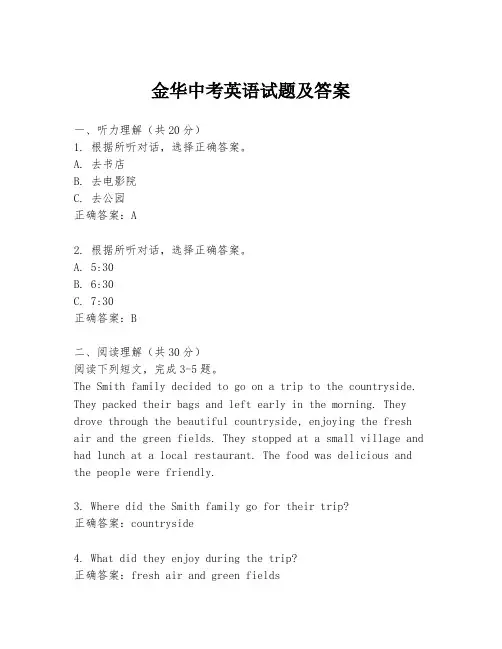
金华中考英语试题及答案一、听力理解(共20分)1. 根据所听对话,选择正确答案。
A. 去书店B. 去电影院C. 去公园正确答案:A2. 根据所听对话,选择正确答案。
A. 5:30B. 6:30C. 7:30正确答案:B二、阅读理解(共30分)阅读下列短文,完成3-5题。
The Smith family decided to go on a trip to the countryside. They packed their bags and left early in the morning. They drove through the beautiful countryside, enjoying the fresh air and the green fields. They stopped at a small village and had lunch at a local restaurant. The food was delicious and the people were friendly.3. Where did the Smith family go for their trip?正确答案:countryside4. What did they enjoy during the trip?正确答案:fresh air and green fields5. Where did they have lunch?正确答案:a local restaurant in a small village三、完形填空(共20分)阅读下面的短文,从6-10题所给的选项中,选择最恰当的一项填空。
Mr. Brown was a kind man. He always helped others. One day, he saw a little girl crying in the street. He went up to her and asked, "What's wrong?" The girl told him that she lost her way home. Mr. Brown decided to help her find her way. After some time, they found her home and her parents were very thankful.6. Mr. Brown was a ______ man.A. kindB. lazyC. selfish正确答案:A7. The little girl was crying because she ______.A. was hungryB. lost her way homeC. was scared正确答案:B8. Mr. Brown decided to ______.A. ignore herB. help herC. call the police正确答案:B9. They found her home after ______.A. a long timeB. some timeC. no time正确答案:B10. Her parents were ______.A. angryB. thankfulC. sad正确答案:B四、语法填空(共15分)阅读下面的短文,根据语境和语法知识填空。
by the end of 加过去时间,用于过去完成时;by the end of 加将来时间,用于将来完成时。
中考英语110条重点短语归纳1.put down 放下shut down 把…关上cut down砍掉come down下来、落下slow down 减缓、放慢sit down坐下write down写下get down下来,降落2.after all毕竟.终究after that于是.然后day after day日复一日地one after another相继.挨次soon after不久以后the day after tomorrow后天3. come up with找到、提出catch up with赶上wake up弄醒、醒来send up 发射open up开设、开办grow up长大pick up拾起、捡起hands up举手eat up 吃光clean up打扫干净give up doing sth.=stop doing sth.放弃做某事4.arrive at/in + n.到达get to +n.到达reach + n.到达arrive / get +adv.到达5.get…back退还,送回去.取回give back归还come back回来at the back of 在…的后面on the way (back)home在回家路上6. at least至少at breakfast早餐时at desk在桌前at once立刻,马上at school 在上学at the same time同时at work在工作be good at=do well in 善长laugh at嘲笑not…at all一点也不at first起初at night在晚上at noon中午.at the age of // when sb. was…years old 在…岁时at last / in the end / finally 最后、终于.at the beginning of the twenty-first century在21世纪初,at the end of 在…终点、结尾at the moment // now现在at the foot of在…脚下at Christmas在圣诞节at any moment任何时候at times(sometimes)有时,偶尔at the doctor’s在医务室be bad at不善长7.for example例如for ever永远be good for对…有益be bad for对…有害for long=for a long time长期for short 简称be short for是…的简称TV is short for “television”8. come true实现come down下来come from=be from来自,出生于comein/into进入,进来come on赶快come over过来come along走吧,过来,快点,come and go来来去去come up上来come out出来,(花)开,(照片)冲洗出来9.even though=even if即使、虽然、尽管10. be pleased with对…感到满意be covered with被…覆盖be expected to do sth.被期望做某事be proud of 以…自豪speak highly of 称赞be afraid of害怕hear of听说(hear from sb.收到某人的来信)of cause=certainly当然可以plenty of= a lot of许多11.by the way顺便说by oneself单独,独自by the end of到…为至by the time(引起时间状语从句)到…的时候one by one依次by air / plane乘飞机by bus / train / car乘公共汽车/火车/轿车(catch a bus赶公交车get on / off the bus 上/下车take a bus to…=go to …by b us乘车去)12.do / try one’s best尽力do one’s homework做家庭作业do (the/some) shopping购物do the cooking烹饪do some cleaning打扫do the / somewashing洗衣服do sport做运动do with sb / sth.处理well done干得好(From:)13.early in the morning一大早in the early spring初春in my early days我幼年时期early bus早班车14.make a contribution to贡献给、捐献make a telephone call to sb. // ring sb. up // give sb. a call // phone sb.给某人打电话connect…to…把…与…连接起来be close to靠近(某地) give birth to生(孩子) lose to sb输给sb .15.either…or…或者…或者..on either side of the street街道任何一边(on each side of the street街道每一边on both sides of the street街道两边)16.keep doing sth.不停地做某事(表示状态继续)keep on doing sth. 坚持做某事(表示动作反复进行)practise doing sth.练习做某事enjoy doing sth.喜欢做某事finish doing sth.做完某事go on doing sth.继续做某事(同一件事)17.go on to do sth.接着做某事(另一事) go straight along 沿着…一直往前走, go down下降, go for a walk散步, go over复习, go shopping买东西, go to the cinema去看电影, go well进展顺利, go off to动身前往, go out外出, go to work 去上班, go up上升, want a go 想试一试18. think about考虑(think of 认为、想起、考虑、想到think over仔细考虑think out想出)talk about谈论, worry about担心, How / What about…?…怎么样?19.borrow…from …从…借….(lend…to…把…借给…)from door to door挨家挨户, from time to time时时, from now on 从今以后, from then on 从那以后, be different from与…不同, learn…from…向…学习20.get dressed穿衣, get into进入, get / be lost丢失, get off / on下/上车, get on well with sb.与某人相处得好, get out of从…出来, get ready for +n.为…做准备, get ready to do sth.准备做某事, get / go to sleep (fall asleep)入睡, (be asleep睡着) get warm 变暧, get well康复, get a chance 有机会、得到机会21. look for 寻找, wait for等候, look after=take care of照看, look like看起来像, look over检查,复习, look out小心,从里向外看, look the same看起来一样, look up向上看,查单词, look around环视look forward to期望, look through温习,检查22. set off 出发、动身, put off 推迟, keep off 避开、不靠近… drop off放下(某物),turn off关, jump off跳离, take off脱(衣),(飞机)起飞(From:)23. half a kilo半千克, half an hour半小时, in half分成两半, half of the day 半天24. do eye exercises做眼保健操, do morning exercises做早操take (more) exercise (多)参加体育锻炼, an exercise book练习本25. take part in参加, hand in上交, in hospital住院, in surprise吃惊地, in the sun在阳光下, in trouble处于困境, in a minute / moment马上26. leave for…动身去某地27 feed on 以…为主食, live on继续活着, base on以…为根据, carry on 坚持、继续下去, and so on 等等, on the other hand另一方面, on foot步行28.be famous for以..著名, be excited about +n./V-ing对…感到兴奋, be interested in 对…感兴趣, be born出生, be busy with sth.— be busy doing sth.忙于…be amazed at 对..感到惊讶29.move away移开, move to(搬)移到30.search the Internet上网31.make sure 确信, make a dialogue编对话, make a mistake犯错误(by mistake由于疏忽) make a noise吵闹, make faces做鬼脸, make friends (with)和..交朋友, make room for给..让地方, make tea沏茶, make money赚钱, make a decision作出决定ed to do sth过去常常做某事, be used to doing sth.习惯于做某事33. leave sth+介词短语“把……忘记在某处”34.forget to do sth.忘记做某事, encourage sb. to do sth.鼓励某人做某事, decide to do sth.决定做某事, allow sb. to do sth.允许某人做某事35.hear sb. to do (doing)sth.听见某人做某事36.help sb. (to) do sth .//help sb. with sth. 帮助某人做某事, with one’s help 在某人的帮助下, with pleasure乐意37.the summer holiday(s)暑假the winter holiday(s)寒假38.step into走进, pour into倒入…39.in the first第一, for the first time第一次, at first起初, a firs t language 母语, first of all首先40.leave a message for sb.给某人留条, give / take sb. a message给某人捎口信41. take photos / pictures 照像, take away拿走, take out取出(work out算出) take care当心, take medicine 服药take one’s temperature量体温, take one’s time别着急, take a walk散步, take place发生42. learn by oneself / teach oneself自学, learn by heart背熟43. a year and a half (one and a half years ) 一年半44.have a try尝试,努力, try out尝试、试验, find out / about找出,查明, havea good / wonderful / great / time玩得开心, have a (bad) cold(重)感冒, have a meeting / walk / watch开会/散步/比赛, have sports进行体育活动, have nothing / sth. to do with与..无(有)关, have no idea不知道, have (one’s) medicine服药45. offer sb sth.给某人提供某物46.win first prize获一等奖47.all over the world= around the world =throughout the world全世界48. all kinds of 各种各样的49. neither… nor 既不…也不….50. not only … but also …不但…而且, both… and ……和…都51. the more , the better 越多越好52. all one’s life 一生53. as soon as 一…就… as soon as possible尽可能早地、尽快as well = too 也, as much as至多, as little as至少, regard …as 把…当作… , as if 好像54. no matter 无论…55 ever since 从那以后,此后一直56.so far 到目前为止, or so大约57. another two hours (=two more hours )又(再) 2个小时58. three times a week一周三次59. the number of…的数量a (large / good) number of / large numbers of / many许多60.less than少于, less and less 越来越少61.…is another way of saying…什么是..的另一说法Quick is another way of saying fast. Bike is short for bicycle.62. not…until…直到…才…63.be like像, feel like +n./V-ing想要, like best最喜欢, would like to 想要64.the 24 hour clock 24小时制65.wash away冲走,run away逃跑, take away带走66.before long不久, long before / ago很久以前, for long =for a long time 长期, no longer = not. .any longer不再67.more or less = about或多或少,大约more than = over多于,超过68.every year每年, every four years每隔四年, every other day每隔一天, everyday English / life日常英语/生活69. next to紧挨着, next door隔壁,邻居, next year明年, next time下次70.receive / get / have a letter from sb. = hear from sb 收到某人的来信71.on show = on display展览72.be filled with / be full of充满…73. thank to =because of由于74.some day =one day(将来)某一天, all day终日, day and night 日日夜夜, in a day or two一两天内in the old days从前,旧社会, from day to day (day after day)日复一日, the day before yesterday前天, the day after tomorrow后天, Tree Planting Day植树节, Wo men’s Day 妇女节75. keep / stop / prevent… (from) doing sth.防止(阻止)…做某事, stop to do sth.停下来去做某事, stop doing sth.停止做某事76.nice and +adj. = very +adj.很,非常77. a place (places) of interest 名胜78.three quarters of the information on the Internet因特网上四分之三的信息, two thirds of the books三分之二的书79. credit card信用卡80. the increasing population增长着的人口81 a path of travel旅行路线82 . point at / to指向83. by sea = by ship乘船, by the sea = on the sea 在海边, at sea在海上84. set one’s mind to do sth.一心想做某事85 .multiply…by…乘以…86. See you!再见You see.你知道,你明白,你瞧, Let me see.让我想想, see sb. off给某人送行, see a / the doctor看病, see sb . do / doing sth.看见某人做某事87 some…others一些(人,物)…其他(人,物) one…another一个..另一个(三者或以上) one…the other一个…另一个(总数二个)88. be worn out穿旧,磨坏, check out核实,检查, write out写出, take sth. out of从…拿出/取出某物89. in this way用这种方法, in a few year’s time几年以后, in space在太空, in and out of class在课内课外, in the last fifteen minutes在最后十五分钟里, in the second half 在下半场, later in one’s life在某人后半身, in the air在空中, in the open air在户外90.give sb. an injection给某人打针, get an injection打针91.have been to去过某地, have gone to到某地去了92.here + be+ 名词+ for+某人( Here is a letter for you.这儿有你的一封信.)93.be far behind +某人(He is far behind others. 他落后于别人)94. one of + adj.最高级+复数名词95. take +某物+with +某人(You’d better take an umbrella with you.你最好带上雨伞)96. prefer to= like…better than宁愿,更喜欢prefer + V-ing (to do sth.) ( I prefer doing (to do) it myself .我喜欢自己做那件事). Would / should等情态动词+ prefer +不定式. (I would prefer to do it myself.我宁愿自己做那件事) , prefer +名词(v-ing) + to+名词(v-ing) (I prefer learning English to playing football.我愿意学英语而不愿踢足球) ; prefer +不定式(名词)+ rather than + 不带to的不定式, (I prefer to walk there rather than go by bus.我喜欢走着去那里,而不愿乘车) , prefer + 名词(代词) to do sth. (We prefer her not to come.我们宁愿她不来) 97. 人+ spend +time (money) +(in) doing sth. (I spent over two hours (in) finishing my homework.我花了两个多小时完成家庭作业.) , 人+ spend + time (money) + on +名词, (He spent 1,000 on the TV set .他花了一千元买电视机). 人+ pay + money +for +sth. ( He paid ten yuan for the book .他花了10元钱买那本书.) It + takes (will take, / took…) + sb. + time (money) + to do sth. (It’ll take you only ten minutes to get there by bus.乘车去那里只花你10分钟). 物+ cost + (sb.) + money, (The dictionary cost me 20 yuan .我花20元钱买了那本词典)98. do with + sb. / sth. (What have you done with the pork ? 那些肉你怎么处理了?)99. mind + if 从句, (Do you mind if I open the window?我开窗你不反对吧?) mind + V-ing, (Would you mind turning on the TV?打开电视你不反对吧?) 100. what…for? / why…? (What do you learn Englis h for? = Why do you learn English?)101. need + 名词(v-ing), (The students need some help.学生们需要帮助.This pair of shoes needs mending.这双鞋需要修理)102. “be used for+ 名词(v-ing),”被用来做.. (A writing brush is used for writing.) “be used as+名词”, 被作为…使用(English is used as the first language in none of these countries. ) “be used by+动作执行者”, 被…使用, 103.be made of 由…制造(This table is made of wood .这张课桌是木制的) be made from由…制成(This kind of paper is made from wood . 这种纸是用木材制成的) be made in+地点, “某地制造”(These cars are made in Germany) be made by+人, “由谁制造的” (This kite is made by Kate . )104. more developed countries发达国家, less developed countries不发达国家, developing countries发展中国家105.be worth + money (V-ing),值…钱.值得做…This car is worth more than two million yuan in China. This book is well worth reading.这本书很值得一读. 106. the Summer Palace颐和园, Tian’anmen Square天安门广场, the Palace Museum故宫, the Great Hall of the People人民大会堂, the Temple of Heaven天坛, the Great Green Wall绿色长城, PLA中国人民解放军, PRC 中华人民共和国, the Party中国共产党, the League共青团, Peking Opera京剧107 a digital camera数字照相机, a doctor for animals = an animal doctor动物医生108. so + 形/副+that 从句, (The place is so cold that nothing can grow in winter .这地方太冷,冬天什么都不长) so + many / few+ 复数名词+that从句(He has so many books that I do n’t know which one to borrow. 他有那么多书,我不知道借哪一本) so + much / little+ 不可数名词+that从句(She has so little money that she can’t buy anything .她钱太少,什么也买不到.) so+ 形容词+a / an +单数名词+that从句(This is so good a book that all of us like reading it ) , such +a / an+ 形容词+单数名词+ that从句(This is such an interesting story that all of us like it) , such +形容词+复数名词+that从句. such +形容词+不可数名词+that从句(It is such fine weather today that many children are playing outside)109 .tell sb about sth.告诉某人关于某事, tell sb+从句, tell sb. to do sth.让某人做某事, tell a lie说谎, tell a story讲故事, thank you for +n ./V-ing 谢谢你… too + adj. / adv. + to + v.太…而不能, too much(修饰名词)太多,过分, much too(修饰adj./adv.)太110. hope / wish+不定式(或从句), wish sb. to do sth. What do you mean by…?= What does… mean?…是什么意思?。
Module 3 Music【重点单词】1.composer n.作曲家→________ vt.创作,作曲;组成→___________ n.作文,作曲→composed adj. 由……组成的2. _________ n. 音乐家→music n.音乐→_______ adj.音乐的3. _______ n.指挥→direct v. 指挥,指导→______ n.方向→________ adj. 直接的4.lose vt.失去→___ n.损失→____ adj. 迷失的,丢失的5.tour vt. & n.巡回演出;观光,旅游→_______ n.旅游者→______ n. 旅游业6.talent n. 天分,天赋→_______ adj.有天赋的→___________ n. 天分,天赋(同义词)7. _________ vt. &n. 影响→influential adj. 有影响的8. _____ vt. &n. 录音,记录,唱片→recorder n.录音机9.mix vt. 使混合→_______ n. 混合物【重点短语】1.因……而出名2.把……变成3.有史以来4.到……时为止5.对……印象深刻6.变聋7.对……有影响8.分裂9.记录10.没门儿【重点句型】1.____________________________ for 30 years, Haydn moved to London, ________ he was very successful.在那儿工作了30年后,海顿移居伦敦。
在伦敦,他非常成功。
2. _____________he was 14, Mozart _____________ many pieces for the harpsichord, piano and violin, _________ for orchestras. 莫扎特到14岁的时候,不仅已经谱写了很多管弦乐曲,还谱写了许多拨弦键琴曲、钢琴曲和小提琴曲。
动词16个时态一、一般现在时1.概念:表示经常发生的情况;有规律出现的情况;总是发生的;和事实真理。
2.时间状语:Always, usually, often, sometimes, every week (day, year, month…),once a week(day, year, month…),on Sundays(on Mondays …),3.基本结构:动词原形(如主语为第三人称单数,动词上要改为第三人称单数形式)4.否定形式:主语 + am/is/are + no t + 其他;此时态的谓语动词若为行为动词,则在其前加don't,如主语为第三人称单数,则用doesn't,同时还原行为动词。
5.一般疑问句:把be动词放于句首;用助动词do提问,如主语为第三人称单数,则用does,同时,还原行为动词。
6.例句:It seldom snows here.这里很少下雪。
He is always ready to help others.他总是乐于帮助别人。
Action speaks louder than words.事实胜于雄辩。
二、一般过去时1.概念:过去某个时间里发生的动作或状态;过去习惯性、经常性的动作、行为。
2.时间状语:ago, yesterday, the day before yesterday, last week, last(year, night, month…),in 1989,just now, at the age of 5,one day, long long ago, once upon a time, etc.3.基本结构:主语 + 动词的过去式或be的过去式+名词4.否定形式:主语 + was/were + not + 其他;在行为动词前加didn't,同时还原行为动词。
5.一般疑问句:was或were放于句首;用助动词do的过去式did 提问,同时还原行为动词。
时间的尽头英文版The End of Time.In the vastness of the universe, where galaxies dancein a never-ending symphony, the concept of "time" remains an enigmatic and elusive entity. It is the invisible thread that connects the past, present, and future, shaping the destiny of all creatures in existence. However, what if there were an end to time itself? Would the universe cease to exist, or would it embark on a new journey beyond our comprehension?The quest for the end of time has fascinated philosophers, scientists, and theologians for centuries. It is a question that challenges our understanding of the fundamental laws of nature and the very essence of existence. In this essay, we will delve into the mysteries surrounding the end of time, exploring various theories and perspectives that have been proposed throughout history.One of the earliest theories regarding the end of time comes from ancient civilizations. Many ancient cultures believed that time was cyclical, with the universe undergoing repeated cycles of creation and destruction. In this view, the end of time was seen as the end of a particular cycle, marking the transition to a new era or era of existence. This cyclical view of time was reflected in various mythologies and religious beliefs, often associated with the idea of a "golden age" followed by a period of decline and eventual renewal.However, with the advent of modern science, thecyclical view of time was largely discarded. Instead, scientists began to view time as a linear progression, with a distinct beginning, middle, and potentially an end. One of the most famous theories regarding the end of time comes from the field of cosmology, specifically the theory of the Big Bang. According to this theory, the universe began with a cataclysmic explosion billions of years ago, and has been expanding ever since. If this expansion continues indefinitely, the universe will eventually become so vastand sparse that all matter and energy will become effectively isolated from each other.。
bythetime和bytheendof的区别by the time和by the end of的区别:中文含义及用法不同。
当by the time表示将来的时间,主句用将来完成时,从句用一般现在时来表示将来的动作;by the end of多指时间,常用于完成时态,也可用于将来时态。
一、by the time的中文意思及用法介绍by the time意为到……的时候。
可以表示将来的时间,其主句用将来完成时,从句用一般现在时来表示将来的动作;也可表示过去的时间,其主句用过去完成时,从句用一般过去时。
例句:By the time you get there the meeting will be over.等你到了那里的时候,会议就该结束了。
By the time I arrived on the scene, it was all over.我来到现场时,一切都已结束。
She was tired and out of sorts by the time she arrived home.她回到家里,又累又烦。
By the time we arrived, someone had grabbed all the good seats.我们到达时,所有的好位子都给人占了。
By the time he'd fixed the leak, I was into him for$ 500.他补好漏洞时,我就该付给他500元。
By the time I get home, I'm too tired to do anything active 我到家时累得无法动弹。
By the time we had made landfall the boat looked ten years older!等到我们登陆时,这艘船看似已老了10年!二、by the end of的中文意思及用法介绍by the end of意为在……尽头。
英语课堂教学过渡用语大全一、开始课堂教学(Beginning the lesson)Now, who can remember what we did last lesson?Well, can any of you tell me what we practised last time?OK, l want a student to tell us what we learned/read about/used last lesson. Remember?Do you remember these pictures?We used the pictures and the cards, didn't we?We practised a talk about sports, right?Let's go over it again.Let's read the sentences once more.What about having another practice?How about revising them once more?二、宣布教学计划(Announcing the teaching pIan)first/first of all/and then/later (on)/after that/finally/by the end of-. - etc.one. ... /two... /three... /four..'Practise a dialogueLearn something nowDo some reading / writing / note takingHave some conversation practiceDo some role playin a few minutes/half way through the lesson/when we've finished... /near the end of the l esson/at the end of the lessonif we have enough time/if time permits/if there's time/perhaps we may spend a few minut es on...By the end of the lesson you'll be able to talk about agreements and disagreements.You'll have learnt how to give people advice.You'll have had practice in writing a letter asking for help.You'll be able to use the present perfect tense for checking up.三、组织课堂教学(Getting organized)Would you move your chairs in (up, back, etc. ) ?Could you three move your desks forward please?Will you both move your table this way please?Would you mind straightening the chairs please?Do you mind moving back a bit?Will you make a bigger space here?Could you possibly arrange yourselves to make a group of 3 (4,6, 8, etc. ) ?If you could arrange yourselves to form a group of 5. -.Please would you arrange your chairs in 3 (4, 5 t etc- )?Would you find the handouts we were using last week please?Could you get out the polycopies you had last time please?Will you take out the worksheets you began yesterday please?Let's find the passage we were reading last lesson.Put your other books away, please.No others! That's all.We don't need these pictures. Will you put them away?Not that book. The other one. Yes, the red one.Ready ! Now we can start.Haven't you brought yours? Well, you'll have to share with your neighbour.Have you lost yours? Well, you may share with Li Lei.Haven't you got yours? Forgotten? Well, you should use mine, but don't forget next time.I have some papers to give out now.I have some new books to give out today.Here are some worksheets to hand round.Will you please give these sheets out, Han Mei? Thanks.Please pass these papers back (round, along), please.Take one and (then) pass them on.They're for you to keep.You may have them to keep.I want the materials back please.I want them back at the end of the lesson.You must give them in again, so please don't write on them. OK?Please can you clean the blackboard/the whiteboard/the board?Would you mind cleaning the board, please?Just clean this half.Leave that section.We still need this part.Just clean that bit.Don't clean that side.Not this hit.Only that part.Just that section. Thank you very much.Could you clean the top left-hand corner, please?Will you clean the bottom right-hand corner, please?Please rub of f the yellow words on the left at the top.Would you please rub off the drawings on the right at the bottom?Rub everything off, please.Leave this on, please.四、举例(Giving examples)1. 以速度区分You should use-ing form here, like...(入慢速度)I love playing football."2. 以重复来区分You will have to use 'but' when you express this idea, now listen to the sentence:'I love swimming but I don't like swimming in winter.' (停顿,再读一遍)3. 以重读来区分We ought to use the form 'have done...' such as (加强重点部位的读音力度)'Have you finished that job yet?'4. 以手势来区分五、谈论课堂环境(taking about physical conditions)Don't you think it's too hot in here?Isn't it rather cold in here?Please can you turn the fan on?Would you mind switching the air condition or on? Then we'll be able to keep cool.I'm afraid it's too dark in here. Can you work alright? Can you see alright?Don't we need that light(s) on?Wi1l you open the shutters?Oh, it's much too untidy for us to study in.Please tidy up, will you?Please would you go and ask someone to fix the light?Will you fetch someone to see to the cooler?.六、使用教学工具与设备(Using aids and instruments)Will you fetch the wall charts of Lesson 65?Can you bring me those sets of flash cards of 'food and drink' ?We need a flannel board.Now, I've got some folders of cue cards.Please could you stick the picture up here?Let's find the sticky tape to fix the chart up.Is that alright? Straight? High enough? Can you all see it?Wil1 you give me the scissors? They are to cut these out with.Will you take them down?I'm going to collect the cards in now and put them away.七、使用电教设备(Using electrical equipment)Will you possibly plug the tape recorder in for me?Oh dear. It's too loud, what must you do then?(S: Well, I have to turn the volume down. )I'm afraid it's not loud enough. You'd better turn it up a bit.What's wrong with the recorder? Will you check the plug is in/the switch is on/the mains su pply?It won't work. Can you check the plug is in?I can't get it to work.Now, wait a minute. Let's find the right place on the tape.Shall we go back and play it again?Did you catch that? That seemed to be a bit fast- We'l1 go back and listen again, Ready? Check it is rewound, back to the start.Wind the tape on to the empty spool.Set the counter to O00 at the beginning of the tape.T: Now, let's talk about some pictures. We'll need the O. H. P., that is, the overhead project or. Do you know how to make it work? (教师指引出投影仪的英文名称)S: Electricity.,T: Well, do l need to switch it on first or plug it in?Ss: Plug in.T:Plug it in, good. Can you say that? Come on ! You have... everyone.Ss: You have to plug it in-T: Good l Well, l've plugged it in. Now what?Ss: er-.. You have to switch it...T: Switch it on t on Everyone! You have...Ss: You have to switch it on.T: That's it. Now I'll adjust the mirrors... oh dear, the picture's upside down ! How silly ! lt's too bright'It's not bright enough.It's not clear enough.It's out of focus.Let's adjust the focus.八进行分组活动(Dividing the class up)(1 ) Choral(2) Individuals(3) Teams(4) PairsI want all of you to answer the questions. (Choral)I'd like just one person to continue the sentence. (Individual)I want this part to correct the sentence. (Team)Now let's play the dialogue out in pairs. (Pair)For this, I'm going to divide you down the middle.Now I'll divide you in half.Whose go is it? Not yours- You be quick!It's group 6 first. Now you. Quickly! That's it.It's your turn second.It's their go third.We'll score on the board and we'll see which team wins.I want you to work in groups.In fours. /In groups of four'Turn round and face your neighbour.You haven't anyone to work with, have you?What about joining in with them?九、布置作业(Setting homework)At home tonight, practise the exercise on page 9.At home this evening, not now, revise this dialogue.You are going to compose a piece of writing about today's topic in your notebooks and give it intomorrow morning.For homework, l want you to finish this piece of work.Before next lesson you must go over what we've just learnt from unit 12.It must be done by next lesson.The piece of writing must be completed by next time I see you/this time next week.十结束课堂教学(Ending the lesson)One or two more minutes, just complete the task you're doing and then we'll stop-Now time is up. We'll stop now. You've done enough of that/enough practice at that- Most of you have done that better than last time.I want to collect your papers now please.I'd like to take in your last lot of homework.Please will you give it/pass it up to the end of the row?Put your work on my desk as you leave.Thank you, everyone. Well done.Could you see all the library books are returned, everyone, please?Before you all leave, would you check that all the books are put away?Li Ming, it's your job today to clean the board/collect the readers in/make sure it's all tid y for the next class.I have some announcements to make be fore you go. Could you listen, please?。
a r X i v :g r -q c /0103055v 1 15 M a r 2001The End of Time?Jeremy Butterfield,All Souls College,Oxford OX14AL,EnglandAbstractI discuss Julian Barbour’s Machian theories of dynamics,and his proposal that a Machian perspective enables one to solve the problem of time in quantum ge-ometrodynamics (by saying that there is no time!).I concentrate on his recent book The End of Time (1999).A shortened version will appear in British Journal for Philosophy of Science .1Introduction 2Machian themes in classical physics 2.1The status quo 2.1.1Orthodoxy 2.1.2The consistency problem 2.2Machianism 2.2.1The temporal metric as emergent 2.2.2Machian theories 2.2.3Assessing intrinsic dynamics 3The end of time?3.1Time unreal?The classical case 3.1.1Detenserism and presentism 3.1.2Spontaneity 3.1.3Barbour’s vision:time capsules3.2Evidence from quantum physics?3.2.1Suggestions from Bell3.2.2Solving the problem of time?1IntroductionBarbour is a physicist and historian of physics,whose research has for some thirty years focussed on Machian themes in the foundations of dynamics.There have been three main lines of work:in classical physics,quantum physics,and history of physics—as follows.He has developed novel Machian theories of classical dynamics (both of point-particles and fields),and given a Machian analysis of the structure of general relativity;(some of this work was done in collaboration with Bertotti).As regards quantum physics,he has developed a Machian perspective on quantum geometrodynamics;this is an approach to the quantization of general relativity,which was pioneered by Wheeler and DeWitt,and had its hey-day from about 1965to 1985.More specifically,Barbour proposes that a Machian perspective enables one to solve an outstanding conceptual problem confronting quantum geometrodynamics,the so-called ‘problem of time’.In short,his proposal is that there is no time!(Hence the title of this book.)As regards history,he has uncovered thetangled tale of the reception(and often misinterpretation)of Mach’s ideas in twentieth century physics(including general relativity);and also written a two-volume history of the theory of motion,stretching from the ancient Greeks to the twentieth century.Barbour has now written what is in effect an intellectual autobiography,in the form of a book of popular science([1999]:page references are to this book).It covers all three of his lines of work.It of course emphasises thefirst two,especially the second(the speculative proposals about quantum gravity).The work on classical physics is discussed in Parts2and3of the book;and the quantum speculations in Parts1,4and5.But Barbour also weaves in a considerable amount of historical material.Although it is a popular book,there are three reasons,of increasing importance,to review it in this Journal.Thefirst relates to the style of the book:it is not a hack popularization.Like all good popular science,it makes a real attempt to expound the details,both of established theories and speculative proposals;rather than just stating the main idea—or worse,just gesturing at it with a metaphor which is liable to be as misleading as it is helpful.(The obvious comparison here is with e.g.Penrose’s The Em-peror’s New Mind,as against Hawking’s A Brief History of Time;or as regards magazines, with e.g.Scientific American,as against New Scientist.)The book contains plenty of detailed exposition—exposition often enlivened by metaphors that are helpful as well as vivid.(Some readers will also enjoy the anecdotes of Barbour’s various intellectual strug-gles,journeyings and collaborations.)Barbour also moderates his passionate advocacy of his ideas,especially his quantum speculations,with occasional reminders that they are controversial.The second reason is that,although cognoscenti will know Barbour’s previous work on Machian themes in classical physics(both relativistic and non-relativistic),it is worth having an accessible exposition in a single book.For in some respects,this work goes against prevailing opinion in the philosophy of space and time;and perhaps for this reason,it is still not very well known.I shall devote Section2to this material.To set the scene,I shallfirst describe prevailing opinion,and a problem it faces.Then in discussing Barbour’s Machian theories,I will emphasise how Barbour takes space rather than spacetime as fundamental,and how this is in tension with relativity.1 The third reason relates to Barbour’s denial of time.Philosophers of physics,and indeed metaphysicians,are bound to want to know what this denial amounts to.Fortu-nately,I can present the main ideas in terms of familiar metaphysical categories,without recourse to quantum theory,let alone quantum gravity.I shall do so in Section3.1;we shall see that it is a curious,but coherent,position which combines aspects of modal realism`a la David Lewis and presentism`a la Arthur Prior.Thenfinally,in Section3.2, I shall discuss how Barbour argues for his denial of time from certain claims about theinterpretation of quantum theory,and about quantum gravity.2But beware:although my strategy of postponing quantum theory and quantum grav-ity,with all their obscurities,until Section3.2makes for an exposition more accessible to philosophers,it also carries a ly,it emphasizes those aspects of Barbour’s denial of time which can be explained in terms of classical physics(i.e.roughly,in terms of instantaneous configurations of matter),in particular Barbour’s idea of a‘time capsule’; and it downplays a technical quantum-theoretic aspect,which Barbour(private commu-nication)sees as prior to,and more important than,time capsules.So I should at the outset summarize this aspect,‘the price’,and say why I think my strategy is justified.Barbour believes that his Machian analysis of general relativity gives the best un-derstanding of(and justification for)the two equations that sum up the theory in the form in which it is most easily quantized.(The equations are called the momentum and the Hamiltonian constraint equations;the form of the theory is called the Hamiltonian, or canonical,form.)Since quantizing general relativity(in this form)by an otherwise successful method leads to a static i.e.time-independent quantum state,Barbour con-cludes that we must accept such a state and somehow reconcile it with the appearance of time and change.He takes this to be his main conclusion:and time capsules to be his admittedly conjectural suggestion for how to make the reconciliation.Nevertheless,there is good reason for me to emphasize time capsules,at the expense of the arguments leading to a static quantum state.For as we shall see in Section3.2,most of these arguments have been well known in the physics literature for many years,and some are even prominent in the growing philosophical literature about quantum gravity. Besides,the literature contains several(mostly very technical)strategies for reconciling a static quantum state with the appearance of time and change.Barbour’s time capsules proposal is but one of these,with the advantage that it can be explained non-technically: so in a review of his work,I have of course chosen to focus on it,ignoring the others.I shallfinish this Introduction with my three main criticisms of the book as a popular-ization.First,the book gives the misleading impression that Barbour’s various views are closely connected one with another.In fact,Barbour’s views are by no means a package-deal.In particular,the straightforward and craftsmanlike work in classical physics and in history of physics can be‘bought’;while the denial of time,and the speculations about quantum theory and quantum gravity,are left on the shelf.The other two criticisms both concern‘the end of time’;thefirst from a metaphysical viewpoint,the second from a physical one.First:Barbour often(not just in the‘prospec-tus’,Part1,but also in Parts4and5)states his denial of time in a way that philosophers will immediately interpret as just denying temporal becoming.This is misleading:his view is different from the familiar tenseless(‘B-theory’)view of time—as we will see in Section3.Second:As I mentioned above,the quantum gravity programme on which Barbour fo-cusses,quantum geometrodynamics,has been superseded.Agreed,it has a distinguished descendant,the loop quantum gravity programme,which is one of the two main currentprogrammes;(the other being the superstrings programme,which is utterly different, not just technically,but also in its motivations and framework).But the central notion of a configuration is very different in loop quantum gravity than in quantum geometro-dynamics;and Barbour has yet to tell us how his proposals,e.g.about time capsules, would carry over to it.Besides,even on its own terms,quantum geometrodynamics is very problematic.In particular,its main equation,the Wheeler-DeWitt equation,is not mathematically well-defined,and its‘derivation’is questionable.Though Barbour briefly mentions the rival programmes,and the quantum geometrodynamics programme’s inter-nal difficulties(at pp.38-39,166,192,351),the bulk of the book is devoted to presenting his Machian vision of exactly this programme.So a reader who is a newcomer to the sub-ject will inevitably get the impression that geometrodynamics is still‘one of the runners’in the race of quantum gravity research.Agreed,that race has no clear running-track or rules:it is rather like orienteering in a blizzard—without a map!So indeed,quantum geometrodynamics just might‘come from the back of thefield to win the race’.But newcomers be warned:it seems unlikely.3These three criticisms aside,the book is,overall,very good popular science:we can happily go along with Barbour when he announces that he has‘tried to write primarily for the general reader...but shall be more than happy if my colleagues look over my shoulder’(p.7).2Machian themes in classical physicsI shallfirst summarize the prevailing opinion in the philosophy of space and time,as three claims;and describe how they face a consistency problem.This problem is not insoluble, nor unrecognized;but it is substantive(Section2.1).This will set the scene for discussing Barbour’s own work(Section2.2).2.1The status quo2.1.1OrthodoxyIn contemporary philosophy of space and time,the prevailing opinion is that the devel-opment of physics from the mid-nineteenth century(especially the rise offield theories culminating in general relativity)was the death-knell of the relationist tradition,stem-ming from Leibniz to Mach,of conceiving space and time as systems of spatiotemporal relations between bodies,rather than entities in their own right.More precisely,there are three prevalent claims which need to be articulated here.I shall list them in what I believe to be the order of increasing controversy!4These claims concern,respectively:(1)field vs.matter,(2)whether metrical structure is‘reducible’to matter,and(3)the status of spacetime points.(1)Thefirst claim concerns the rise offield theory since1850.Thus,on the one hand,physics revealed some traditional characteristics of bodies—such as impenetrability and continuity—to be only apparent.And on the other hand,the electromagneticfield was discovered to possess mechanical properties like momentum,angular momentum, energy and(after the advent of special relativity)mass-energy.Besides,matter itself was eventually modelled,with outstanding success,as afield on spacetime;namely in quantumfield theories.Thus Leibniz’s and Mach’s‘bodies’had become diaphanous and omnipresentfields.(2)Second,the various familiar theories—both classical and quantum,relativistic and non-relativistic—postulate a metrical structure of spacetime that seems not to be ‘reducible to spatiotemporal relations of bodies’(in various precise senses of that phrase). Two well known(probably the best known)ways of making this claim precise concern: (a)absolute rotation,and(b)dynamical metrics.For(a),the idea of the argument goes back to Newton’s globes thought-experiment. The two cases—one in which the mutually stationary globes rotate at some constant ve-locity about their common centre of gravity,and the other with no rotation—are intended to show that the metric is irreducible;the idea is that the two cases exhibit the same spa-tiotemporal relations of bodies but different metrical facts.But one needs to be careful about‘metrical facts’.For in any theory,such as Newtonian mechanics or special relativ-ity,in which the metric structure is the‘same in all models’(and so is not dynamical,i.e. not correlated with the distribution of matter),there will be a sense of‘metrical facts’in which these facts cannot differ between two models—and so are trivially determined by, i.e.supervenient upon,spatiotemporal relations between bodies.(Compare the idea in modal metaphysics that a proposition M true in all of a certain class of worlds trivially supervenes on the truth of any proposition S true at some of the worlds:for any two worlds in the class that make S true,also make M true.)There is an obvious strategy for otherwise interpreting‘metrical facts’in such a way that pairs of cases like the two globes nevertheless show some kind of irreducibility of the metric.The idea is that such a pair of cases shows that not all physical possibilities are distinguished by a full description of each of them in terms of the masses,relative distances and relative velocities of bodies;so that there are physically real properties or relations not determined by these.What these are will differ from one proposal to another.But irreducibility will follow,provided the‘metrical facts’include some of the facts involving such undetermined properties or relations.Here the obvious candidate is facts about how the bodies are related to the affine structure of spacetime—in short,about whether their worldlines are geodesics.5As to(b):For a theory with a dynamical metric such as general relativity(or any theory that‘geometrizes gravity’in the sense of coding gravitational force as an aspect of the metric),the above problem of‘metrical facts’being‘the same in all models’,and so trivially determined by the matter distribution,does not arise.Nor is the correlation (or even causal relation)between the metric and the matter distribution,as coded in the field equations,a sign of reduction or even determination(i.e.supervenience).First,we cannot in general specify the matter distribution without the metric.Second,general relativity admits pairs of solutions which agree on their matter distributions but differ metrically.For general relativity,the most-cited cases are the various vacuum(i.e.matter fields zero)solutions.But there are other examples,e.g.the Schwarzschild and Kerr metrics—representing respectively,a non-rotating and a rotating mass in an otherwise empty universe.6(3)Third,the formalisms offield theories,both classical and quantum,suggest that their basic objects are just spacetime points.For in these formalisms,everything apart from these points—matter,whether conceived as point-particles or asfields,and even the metrical structure of spacetime—gets represented as mathematical structures defined on points.This suggests the doctrine nowadays called‘substantivalism’:that spacetime points are genuine objects—indeed are the basic objects of these theories,in that ev-erything else is to be construed as properties of points,or relations between them,or higher-order properties and relations defined over them.Agreed,this doctrine is controversial even among those with no sympathy for rela-tionism.There are two well-known good(though disputable!)reasons for denying it.(a): Thefirst reason is‘the hole argument’.It is natural to formulate these theories,especially those with a dynamical metric(like general relativity),in such a way that their only‘fixed structure’is the local topological and differential structure of a manifold.Intuitively,this means that any map preserving this structure(i.e.any diffeomorphism)preserves the content of the theory.Such a theory is called‘diffeomorphism invariant’;and diffeomor-phism invariance is often taken to indicate that spacetime points are indeed not objects: their appearing to be is an artefact of how we formulate the theory.(b):The second reason is a general philosophical point about objects or ly:we should be wary of taking as the basic objects of our ontology(according to some theory)those items that are postulated as the initial elements in a mathematical presentation of the theory. For it might be just a happenstance of our formulation of the theory that these objects‘comefirst’:a happenstance avoided by another formulation that can be agreed,or at least argued,to be better.2.1.2The consistency problemThese three claims lead to what I will call‘the consistency problem’.This is not a straightforward matter of the claims entailing the problem.Rather,these claims,and the presentations of spacetime theories that are now typical,both in physics textbooks and the philosophy of physics literature,make us think of the metrical structure of spacetime in a certain way—roughly,as‘on all fours’with the matterfields.7And it is this conception that leads to the consistency problem.As I said at the start of the Section,I do not claim that this problem is insoluble:rather it is a lacuna that needs to befilled.Nor is the problem unrecognized:as we will see,Einstein himself recognized it(and dubbed it a problem of‘consistency’).Furthermore,we can nowadays state in broad terms how the problem can be solved(the lacunafilled).But the problem is worth stressing,since it is rarely addressed—and it leads into Barbour’s Machian proposals.I shall present the problem byfirst describing the lacuna in typical modern presen-tations of spacetime theories.In such presentations,one postulatesfirst a spacetime manifold;then,some metric(and affine)structure on it,typically as metricfields;then also some matterfields;thesefields,both metric and matter,obey differential equations; etc.So far,so good.Indeed,so far,so pure mathematical.The connection with observa-tion is then made,for metricfields,by postulating that(ideal)rods and clocks measure the metric,i.e.yield its values as their pointer-readings.Or maybe the connection is made more generally than via the proverbial rods and clocks—by postulating that the be-haviour(perhaps ideal)of matterfields gives us access,in principle,to the metricfields. But—here is the rub—there is,typically,little or no discussion of how the rods and clocks are constructed and how they‘do their stuff’—display pointer-readings that are veridical about spacetime’s metric.(Similarly,for more general accounts of how matter gives access to metric.)If one does not notice this lacuna8,one naturally ignores the question of how indeed they do their stuff;and so falls into thinking of the metric as simply‘read off’by rods and clocks.But of course it is a question that cannot be ignored.In any branch of physics,one has a right to expect a theory of how the instrument works(very often calling on otherbranches of physics,on which the instrument’s functioning depends).In this regard rods and clocks(or whatever else,such as radar signals,is postulated as measuring the metric) are no different from other instruments.An account thatfilled this lacuna would proceed:from(i)the postulation of funda-mental metric and matterfields on spacetime;to(ii)a theoretical description of how(at least idealized)rods and clocks(or whatever else)behave,powerful and accurate enough to secure that:(iii)such rods and clocks(or other matter)would indeed do their stuff—their pointer-readings report the metric.There are four remarks to make about such an account.Broadly speaking,they are positive:there are good prospects for such an account,though the details would of course be very complicated.(Or rather,there are good prospects if we set aside the usual deep controversies about how the macroscopic world emerges from the quantum one.)•The way that(iii)returns to(i)is in no way a suspicious circularity.An account of how things are should be compatible with the explanation how we come to know or believe that very account;and it is even better if the account coheres with,or even is itself a part of,that explanation.•As I mentioned,Einstein himself emphasised the need for such an account,and called the lacuna a problem of‘consistency’.In his Autobiographical Notes,he writes in connection with special relativity:One is struck[by the fact]that the theory introduces two kinds of physicalthings,i.e.(1)measuring rods and clocks,(2)all other things,e.g.theelectro-magneticfield,the material point,etc.This in a certain senseis inconsistent;strictly speaking,measuring rods and clocks would haveto be represented as solutions of the basic equations(objects consistingof moving atomic configurations),not,as it were,as theoretically self-sufficient entities.However,the procedure justifies itself because it wasclear from the very beginning that the postulates of the theory are notstrong enough to deduce from them sufficiently complete equations forphysical events sufficiently free from arbitariness,in order to base uponsuch a foundation a theory of measuring rods and clocks...it was better topermit such inconsistency—with the obligation,however,of eliminating itat a later stage of the theory.But one must not legalize the mentioned sinso far as to imagine that intervals are physical entities of a special type,intrinsically different from other physical variables(“reducing physics togeometry”,etc.).([1949],pp.59-60.)•So the consistency problem is recognized.Indeed,some expositions of relativity, less imbued with the geometric style of presentation,sketch such an account of rods and clocks:trying to discharge,in Einstein’s phrase,the obligation of eliminating the inconsistency.I say‘sketch’because it is very hard to describe,in terms of one’s fundamental physical theory,most types of clock(and most types of any other instrument):Einstein notes this for special relativity,but the point is ofcourse equally valid for other theories,such as continuum mechanics in Newtonian spacetime.As a result,the expositions that sketch such an account often focus on some artificially simple models;e.g.the light-clock,or(as a model of length-contraction)the distortion in a classical atom of the electron’s orbit,due to the atom’s motion;cf.Bell[1976].9•Besides,we have good reason to think we can go beyond such simple models,and in particular accommodate the quantum nature of matter.To take one example,let me sketch a quantum description of length-contraction for a moving rod.(Many thanks to David Wallace for this sketch.)I suppose that we start with some quantum field theory of electrons,the electromagneticfield,and a chargedfield of much higher charge and mass than the electronfield(to simulate atomic nuclei of some particular element).This is a reasonable place to start,because:(i)we certainly need to go beyond classical physics since it cannot describe solid bodies other than phenomenologically(e.g.stipulating a priori that rods are rigid);(ii)on the other hand,to require that we start with the Standard Model and work our way up through quark-quark couplings etc.would be unduly harsh—since after all,we don’t believe it provides thefinal theory of matter.We then need to establish that there are certain states of this multi-field system describing a non-relativistic regime of particles coupled by effective Coulomb forces, with respect to a3+1split given by some Lorentz frame;and that in this regime, there are states corresponding to rigid non-relativistic matter,say a crystal.Suppose we succeed in this.Of course this is conceptually and technically difficult,given the interpretative problems of quantumfield theory,and the complexities of solid state physics.But given that there are such states,we can argue that a rod made of this crystalline matter will exhibit length contraction;as follows.If the rod is accelerated gently enough,the internal vibrations(phonons)due to the acceleration will be small and will rapidly thermalise(heating the crystal up slightly until the heat is lost to the environment),and the crystal will enter the stateˆB|ψ ; whereˆB is the Galilean boost operator for thefinal velocity attained,and|ψ is the original state of the rod i.e.the state of a rigid crystal with length(say)l given by the metric in our initial frame.The fact that sufficiently small Lorentz boosts can be approximated by Galilean boosts then implies that we can iterate boosts to move|ψ into the stateˆB L|ψ ,where stateˆB L is any Lorentz boost.Since the underlying quantum-field-theoretic dynamical laws are Lorentz-covariant,it follows thatˆB L|ψ has length l as given by the metric in the boosted frame.So we have established that the crystal accurately measures the metric in its rest frame, i.e.length contraction.(Or more accurately,we would have established this if our sketch werefilled in!).To sum up:though one faces a consistency problem if one postulates a metric‘on allfours’with matterfields,our current theories of matter seem able to solve the problem, at least in outline.2.2MachianismIn this subsection,I willfirst make two general points about Barbour’s variety of Machi-anism,and discuss his attitude to Section2.1.1’s three claims(1)to(3)(Section2.2.1). This will lead to some details of his Machian theories(Section2.2.2).I will end with some evaluative comments about these proposals,especially the central ingredient of the Machian theories—the notion of an instantaneous configuration(Section2.2.3).2.2.1The temporal metric as emergentOne naturally expects that ceteris paribus,the consistency problem will be easier to solve, the weaker the metrical structure of spacetime that one postulates‘on all fours’with matterfields:for there will be less structure that,for consistency,instruments’pointer-readings have to‘reveal’.On the other hand,one needs to postulate enough structure to be able to write down a dynamical theory:one cannot expect all such structure to be reducible to matter(cf.(2)of Section2.1.1).So the question arises whether there are interesting dynamical theories that postulate less metrical structure than the familiar theories.Barbour’s work shows that the answer is‘Yes’.There are two immediate points to make about this‘Yes’.First,in the theories Bar-bour has developed so far,the gain mostly concerns the temporal aspect of the spacetime metric:though the temporal metric‘emerges’from the rest of physics,the spatial metric is still postulated.10Second,a point about the notion of‘emergence’.Usually,this notion is vague:and philosophers think of making it more precise in terms of various definitions of reduction, or some weaker analogue,such as supervenience.It will turn out that in the context of Barbour’s views,two more precise versions play a role,one for the classical context (this Section),and one for the context of quantum gravity(Section3).In the classical context,Barbour’s notion is logically strong,indeed surprisingly so.For Barbour provides examples of theories in which a temporal(though not spatial)metric is emergent in the strong sense of being fully definable from the rest of the physical theory.So this is emergence in as strong a sense of reduction as you might want.On the other hand,in the context of quantum gravity,Barbour’s notion is logically weak(though again the detail is surprising).For his denial that there is time leads to his saying that our illusion to the contrary—that there is time—is a partial and misleading‘appearance’of the timeless underlying reality.I turn to discussing Barbour’s attitude to Section2.1.1’s claims,(1)to(3),of‘pre-vailing opinion’;in particular to justifying my statement(in footnote4)that he agrees to(1)and(2),and maybe also(3).Since claim(2),about the irreducibility of metric to matter,concerns‘the various familiar theories’,it is already clear that he can accept it while nevertheless seeking theories in which there is some kind of reducibility.The kind of theory he seeks emerges more clearly from his replies to(1)and(3).As to the claim(1),Barbour accepts that physics since1850has‘abolished body’.But he takes this to mean just that we should state Machian proposals in terms of the modern conception of matter,namely as matterfields.So although Barbour presents Machian theories of point-particles(pp.71-86,115-120;and similarly in his technical articles), that is intended as a piece of pedagogy and/or heuristics—a path I will follow in Section 2.2.2.As he stresses,the main physical ideas of these theories carry over tofield theories.This of course prompts the question:how exactly does Barbour conceivefield theories? In particular,does he accept the existence of spacetime points,as advocated by claim(3)? It will be clearest to break the answer to these questions into two parts.Thefirst part concerns Barbour’s different attitudes to spacetime,and to space:this part relates closely to the physical details of his proposals,and will engender several comments.The second part concerns Barbour’s relationist understanding of space;it is more philosophical,and will crop up again later—at this stage,it can be dealt with briefly.Thefirst part of the answer is,in short,that Barbour seems happy to accept the existence of spatial(but not spacetime)points,and to postulate that these points form a3-dimensional manifold with metric(spatial geometry).For he discussesfield theories (relativistic and non-relativistic)in terms of the evolution through time of instantaneous 3-dimensional configurations,i.e.states of a3-dimensional spatial manifold.But one needs to be careful;(and here lies the second part of the answer).Since Barbour seeks a relationist understanding of space,he wants to treat metrical relations in afield theory, not in terms of a metricfield tensor on a3-manifold of spatial points,but as very similar to inter-particle distances in theories of point-particles.This kind of treatment will become clearer in Section2.2.2.2.Here it suffices to say two things.(i)The main idea is that, just as a Machian theory of N point-particles will treat metrical relations as essentially a matter of N(N−1)/2inter-particle distances,a Machianfield theory will postulate point-like parts of a matterfield and then treat metrical relations in terms of the continuous infinity of all the pairwise distances between these point-like parts.(ii)As we shall see in a moment(and again in Sections2.2.2.2and2.2.3),this sort of Machian treatment of field theories has difficulties with general relativity.Thefirst part of the answer—that Barbour postulates space,and spatial geometry, but is leary of spacetime—also needs to be clarified in other ways.Indeed,it holds good for his discussion of both classical non-relativisticfield theories,and quantum theories. By his lights,spacetime notions have no central role in either of these types of theory.But his reasons are rather different for the two types(as I hinted above,in discussing strong and weak emergence).For classical non-relativisticfield theories,the temporal structure (and so spacetime structure)is fully defined,in Barbour’s Machian theories,by the rest of the theory:but(modulo the attempt to understand space relationally)these theories。